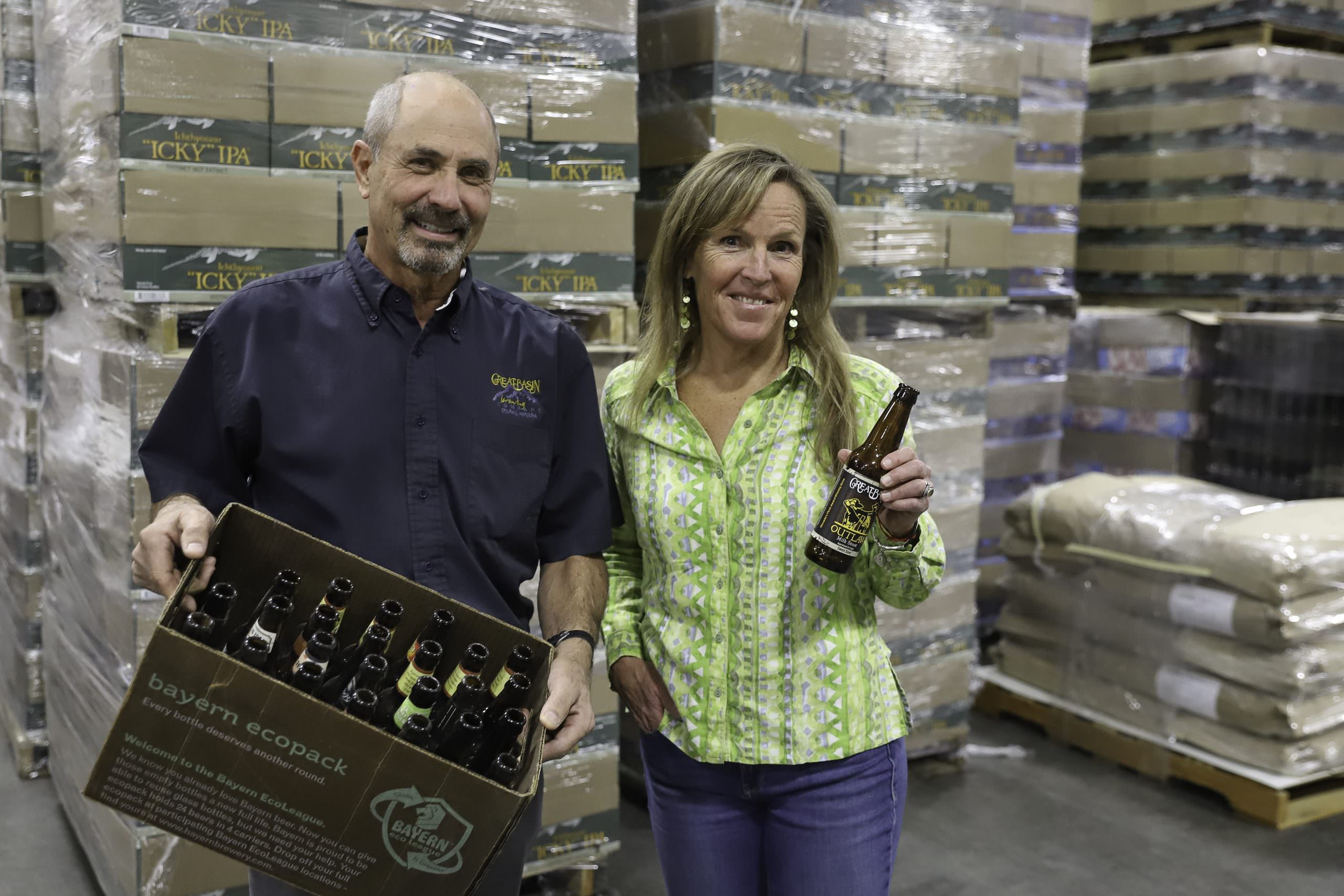edible notables
EARTH-FRIENDLY BOTTLING
Local company owner aims to lessen the craft beer industry’s carbon footprint.
WRITTEN BY NATASHA BOURLIN
ILLUSTRATION BY SHAUN HUNTER
Tom Young, owner and brewmaster of Great Basin Brewing Co., and Caren McNamara, owner of Conscious Container, display some of the recycled bottles collected at the brewery for cleaning and reuse
Growing up in a largely waste-free house, Caren McNamara’s upbringing and entrepreneurial spirit drove her to form a business that would have a positive impact on the planet.
An awareness that people in nearly every other continent reuse their glass bottles inspired her to investigate the concept in the U.S. A year’s worth of researching the reuse, waste, recycling, and glass-reliant industries as well as creating a proof of concept led to the birth of Conscious Container in February 2017.
After some due diligence, McNamara narrowed her target to craft beer businesses. She wanted to create a program to reuse a portion of the millions of craft beer bottles filled and sold in this country annually. Most bottles can be refilled up to 25 times, helping to avoid the further adverse environmental impacts of transportation, production, and raw materials extraction.
Reusing bottles is an economically viable prospect for craft brewers and an environmentally conscious one both brewers and consumers welcome.
“What is the problem, and where are the solutions? As a bootstrapping start-up, where do we start?” McNamara asked herself. “I needed a clear proof of concept. Then everyone liked it and wanted to be a part of it.”
Viable vision
States such as California and Oregon have incentive-based systems in place to encourage recycling. Shoppers pay a few cents per bottle upon purchase at retailers, then get them back when returning their bottles to recycling redemption centers.
McNamara explored the Oregon Beverage Recycling Cooperative process, which she says has the best system in the U.S. Annually, it keeps 104 million pounds of glass out of landfills.
To further the concept of reuse over recycling, OBRC also developed an industry-standard craft beer bottle with Owens-Illinois Glass Co., one of the largest glass bottle manufacturer in the world. An industry-standard design without proprietary shapes, colors, or branding helped provide an infrastructure for the reuse program McNamara wanted to build.
Truckee-based Conscious Container offers an incentive program in which people may drop off their clean, empty, 12-ounce beer bottles that fit CC’s criteria at select locations listed on its website; the bottles then are collected and reused by brewery partners.
Reusing bottles is critical in states such as Nevada that don’t have recycling incentives. McNamara’s research showed most recycled glass bottles in The Silver State end up broken in the process, then used to cover landfills.
She partnered with Great Basin Brewing Co. in Reno and Sparks to reuse returned bottles, provide financial perks for those dropping them off, and serve as a collection and storage point.
“We at Great Basin are excited to support the efforts of Conscious Container to steer our industry (and other industries) toward a direction of reuse instead of clogging our recycle chains, landfills, and manufacturing facilities,” says owner and brewmaster of Great Basin Brewing Co. Tom Young.
Missoula, Montana-based Bayern Brewing, which McNamara says is one of only two breweries in the country with its own costly bottle-washing system, picked up about 17,000 of the 24,000 bottles collected during CC’s pilot program between June 2017 and 2018.
Bayern trucks stop in Reno to pick up reusable bottles on the way back to the brewery from the Bay Area distribution center. Once in the brewery they can be cleaned and sterilized in house. Reusing bottles is a more cost-effective option, seeing as new bottles cost about 15 cents each and reused bottles are just 5 cents each.
Growing the business
Now, after nearly two years in operation, Conscious Container largely has been a one-woman show. With some help, McNamara examines and cleans the returned bottles, transports them, and fosters relationships to further her mission.
But more funding is needed to reach her lofty goals to grow CC’s infrastructure and reach, expand collection sites to workplaces, eventually purchase her own bottle-washing equipment, and create legislation to incentivize bottle reuse.
While one woman’s diligent attempts to benefit the planet are impressive, it really takes a village.
“I’m just one person doing my best, and the people who have stepped up to help me have been amazing,” McNamara says. “But I can’t do any more myself.”
To help McNamara’s mission and for information on what types of bottles the company accepts for reuse and where to drop them off, visit Consciouscontainer.com.
Natasha Bourlin is a freelance writer who enjoys learning new ways to help the planet while imbibing.


